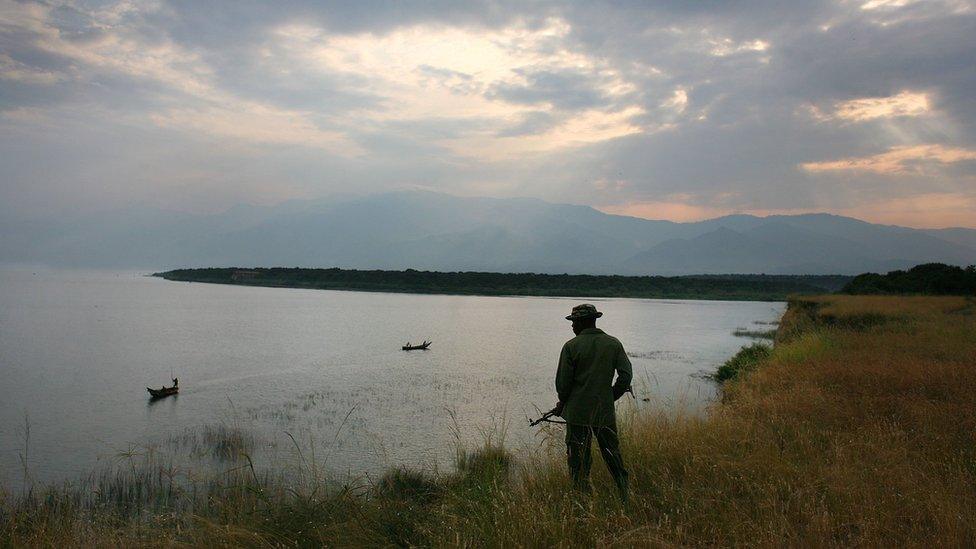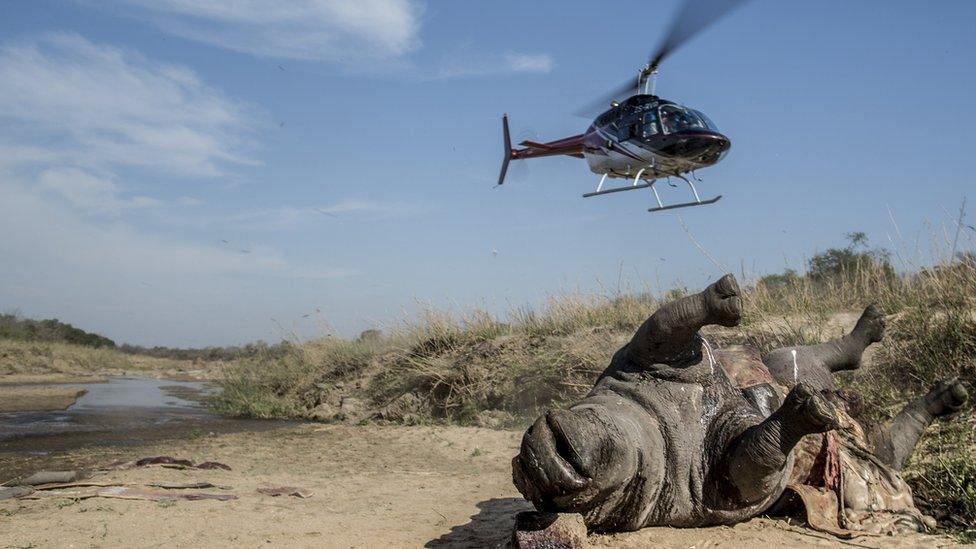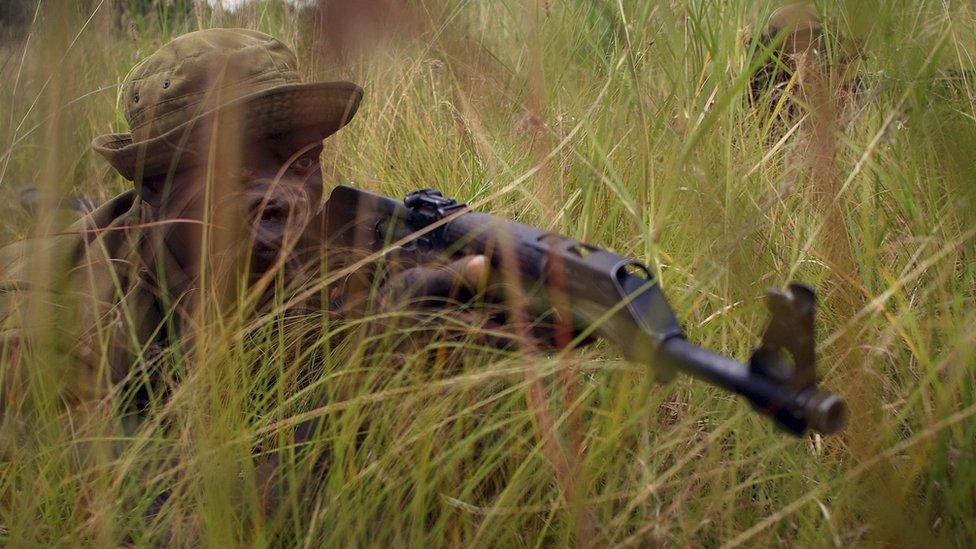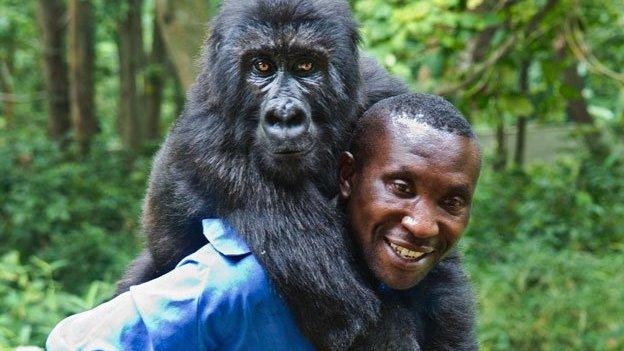Letter from Africa: Game rangers in danger
- Published

In our series of letters from African journalists, film-maker and columnist Farai Sevenzo looks at those most in danger in the battle against poachers in Africa.
World Ranger Day (31 July) is dedicated to the men and women who put themselves on the frontline to protect our wildlife from one of the biggest armed scourges of the 21st Century.
Some estimate that gangs of poachers kill two or three rangers every week in game reserves across Africa.
It has become a bitter battle against poaching.
If the elephants and the rhinos could release press statements on their respective international days, they would tell you that the killings of their kind have multiplied since 2006.
And even though some recent studies suggest the killing of elephants has slowed, some experts believe that the decline in deaths could be down to fewer elephants being alive to poach.
Organised criminals with sophisticated GPS systems and deadly arms seem to stop at nothing to get tusks and rhino horns to sell in Asian markets for millions of dollars.
It is the rangers who stand between them and the killers.

Farai Sevenzo:

"It is no surprise that South Sudan's protracted rebellions have affected animals and the men and women who try to protect them"

A recent WWF survey, external of game rangers in Africa found some rangers barely had the equipment, including boots, to fight poachers in Tanzania and the Democratic Republic of Congo and were regularly abandoned as a low priority of governments.
Of those surveyed, 75% said they had been threatened by community members for the work they do in protecting wildlife and a staggering 54% said they would not want their children to become rangers - which is bad news for those elephants, rhinos and gorillas slowly dwindling to extinction.
Just two weeks ago the Zimbabwe Parks and Wildlife Management Authority put out a tender for the supply of new vehicles for its directors and an advert for two new executives just when its working rangers, toiling to stop poachers in 45C heat, had not been paid for three months.
Members of a parliamentary committee on the environment noticed the lack of priorities and were not impressed.

More on poaching in Africa:


It is also clear that the pressure on a ranger can come from their own, so it is little wonder that some of them are turning from game keeper to poacher just to stay alive.
Zimbabwe has managed to capture two of its most-wanted poaching suspects in the last week, according to the state-run Chronicle newspaper, external.
Altogether 10 suspects were arrested in separate operations, though its report shows the difficulty of tracking down poachers.
The tools of their trade may be simple - the paper lists some being arrested with a couple of rifles, a silencer, ammunition, a knife, a torch and a getaway car - but their collusion with local chiefs makes them more lethal to animals and rangers alike.
It is no surprise that the deaths of elephants and rangers in DR Congo were at the hands of armed militias, and that South Sudan's protracted rebellions have affected animals and the men and women who try to protect them.

Rangers, even with equipment, find it difficult to protect rhinos in Kruger National Park
The director of South Sudan's Lantoto National Game Park, where 10 elephants were killed by poachers in June, says the instability in his country is to blame.
"You know animals are like people and when there is continuous presence of fighting and hunting down in the country, they tend to run away in search of peaceful environment," Col Natalino Lasuba recently told South Sudan's Radio Tamazuj, external.
He said park rangers faced challenges including heavy rains, lack of logistical and communication equipment, inadequate numbers - as well as the inevitable clashes with armed poachers.
'Ranger trauma'
Virunga National Park in DR Congo - home to the endangered gorillas and Africa's oldest park - documents the rangers who die in the line of duty and has set up a fund to help their widows, external.
One of the latest to die was 40-year-old Sebinyenzi Bavukirahe Yacinthe, who left behind a wife and eight children aged between two and 16 in January.
While Fidele Mulonga Mulegalega and Venant Mumbere Muvesevese were killed in an attack by Mai Mai rebels in March.
"These deaths break the unfathomable barrier of 150 rangers lost in a decade here in Virunga, over 10 of those in the last year alone," the park's director Emmanuel de Merode said in a statement at the time.
"Despite the wide progress we make here in many areas, we cannot sustain these kind of losses in what is still the most dangerous conservation job in the world."

More than 150 rangers have died protecting Virunga National Park in DR Congo in the last decade
Whether it is South Sudan's Boma National Park, DR Congo's Garamba National Park or Kruger National Park in South Africa, the poachers are increasing their firepower and the fallout for the rangers is severe.
Not only are rangers' lives being lost to increased poaching, there is also the psychological fallout. It is creating a new kind of "ranger trauma" to seeing so many butchered animals littering the savannah, including those of rhino and elephant calves.
The animals too do not distinguish between poacher or ranger so some of the dead rangers have been trampled to death by the elephants they were protecting.
Considering that more than 14,000 elephants have been killed between 2003 and 2015, it barely registers as a concern for most African governments.
African governments should treat the prevalence of armed poaching as a national security emergency, and dedicate a large chunk of the defence budget to combating it robustly.
The ranger is in a war few acknowledge is happening on World Ranger Day and every day.

More from Farai Sevenzo:

- Published8 November 2014
